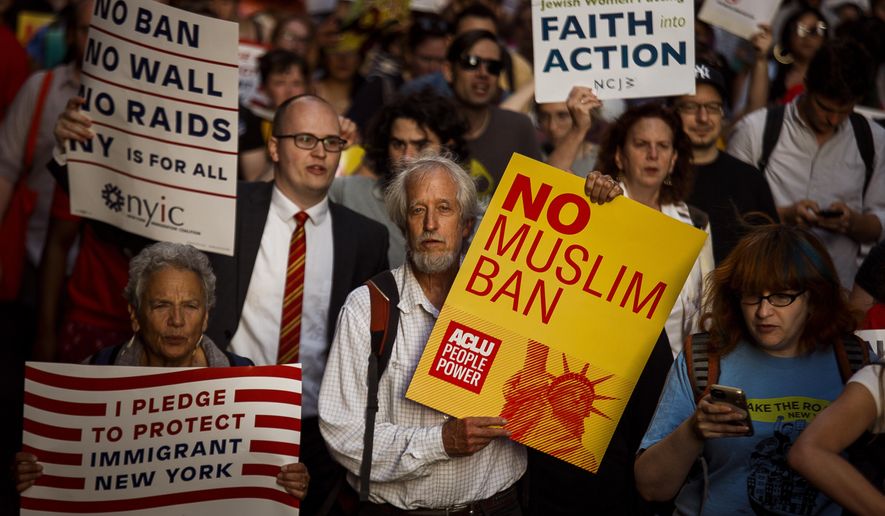The Supreme Court may have upheld President Trump’s travel ban, but several dozen Muslims are still challenging the way his administration is carrying it out, saying he’s not living up to the terms he set for his own policy.
The Muslims, in a new court filing Sunday, said Mr. Trump promised there would be waivers available for people from banned countries who nonetheless showed a special reason why they should be admitted to the U.S. But those waivers haven’t been forthcoming, the Muslims said.
Plaintiffs, who range from a “world-class” Syrian violinist to a number of Iranian professors or investors, say they had been initially cleared for visas to visit the U.S., but when they went to try to actually get their visas, they were denied under the travel ban.
“The blanket denials of visas to applicants from banned countries without the opportunity to demonstrate their eligibility for a waiver from the proclamation, together with statements made by defendants concerning their intent and the application of the travel ban, makes clear that defendants are targeting individuals for discriminatory treatment based on their country of origin or nationality, without any lawful justification,” the plaintiffs say in their new filing.
Their case is being led by Muslim Advocates, a group that has battled Mr. Trump on immigration in general and has been one of the most vocal critics of the travel ban.
The original ban — one of the first major actions of Mr. Trump upon taking office — prohibited nearly all entry into the U.S. of citizens from seven majority-Muslim countries.
After nearly 18 months of court battles, and several revisions to the policy, the latest version applies to Iran, Libya, Somalia, Syria, Yemen, North Korea and Venezuela. For some of the countries the ban is fairly wide, covering most visitors. For Venezuela, the ban applies to government officials and their family members.
That policy was upheld by the Supreme Court in a 5-4 ruling last month, with the court citing the availability of waivers as evidence the policy is carefully crafted.
Writing in dissent, however, Justice Stephen G. Breyer said the waivers were actually a strike against the policy, because the government hadn’t followed through on them.
He said during the first month the new ban was in place the State Department approved just two waivers out of 6,555 applicants. That grew to 430 waivers over the next few months, but that was still “minuscule,” Justice Breyer wrote.
Justice Breyer said that without a working waiver process, the travel ban looks more like a “Muslim ban” that the president’s critics claim the policy really is.
• Stephen Dinan can be reached at sdinan@washingtontimes.com.




Please read our comment policy before commenting.